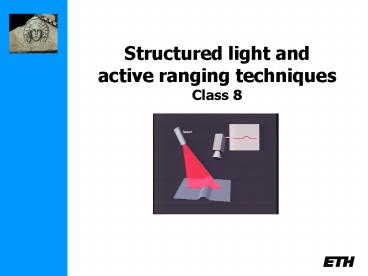Structured light and active ranging techniques Class 8 - PowerPoint PPT Presentation
Title:
Structured light and active ranging techniques Class 8
Description:
Structured light and active ranging techniques Class 8 Plane-sweep multi-view matching Simple algorithm for multiple cameras No rectification necessary, but also no ... – PowerPoint PPT presentation
Number of Views:272
Avg rating:3.0/5.0
Title: Structured light and active ranging techniques Class 8
1
Structured light and active ranging
techniquesClass 8
2
last Wednesday stereo
per-pixel optimization
per-scanline optimization
full image optimization
3
original image pair
planar rectification
polar rectification
4
Plane-sweep multi-view matching
- Simple algorithm for multiple cameras
- No rectification necessary, but also no gain
- Doesnt deal with occlusions
Collins96 Roy and Cox98 (GC) Yang et
al.02/03 (GPU)
5
3D photography course schedule(tentative)
Lecture Exercise
Sept 26 Introduction -
Oct. 3 Geometry Camera model Camera calibration
Oct. 10 Single View Metrology Measuring in images
Oct. 17 Feature Tracking/matching (Friedrich Fraundorfer) Correspondence computation
Oct. 24 Epipolar Geometry F-matrix computation
Oct. 31 Shape-from-Silhouettes (Li Guan) Visual-hull computation
Nov. 7 Stereo matching Project proposals
Nov. 14 Structured light and active range sensing Papers
Nov. 21 Structure from motion Papers
Nov. 28 Multi-view geometry and self-calibration Papers
Dec. 5 Shape-from-X Papers
Dec. 12 3D modeling and registration Papers
Dec. 19 Appearance modeling and image-based rendering Final project presentations
6
Todays class
- unstructured light
- structured light
- time-of-flight
(some slides from Szymon Rusinkiewicz, Brian
Curless)
7
A Taxonomy
8
A taxonomy
9
Unstructured light
- project texture to
- disambiguate stereo
10
Space-time stereo
Davis, Ramamoothi, Rusinkiewicz, CVPR03
11
Space-time stereo
Davis, Ramamoothi, Rusinkiewicz, CVPR03
12
Space-time stereo
Zhang, Curless and Seitz, CVPR03
13
Space-time stereo
Zhang, Curless and Seitz, CVPR03
- results
14
Light Transport Constancy
Davis, Yang, Wang, ICCV05
15
Triangulation
16
Triangulation Moving theCamera and Illumination
- Moving independently leads to problems with
focus, resolution - Most scanners mount camera and light source
rigidly, move them as a unit
17
Triangulation Moving theCamera and Illumination
18
Triangulation Moving theCamera and Illumination
(Rioux et al. 87)
19
Triangulation Extending to 3D
- Possibility 1 add another mirror (flying spot)
- Possibility 2 project a stripe, not a dot
Object
20
Triangulation Scanner Issues
- Accuracy proportional to working volume(typical
is 10001) - Scales down to small working volume(e.g. 5 cm.
working volume, 50 ?m. accuracy) - Does not scale up (baseline too large)
- Two-line-of-sight problem (shadowing from either
camera or laser) - Triangulation angle non-uniform resolution if
too small, shadowing if too big (useful range
15?-30?)
21
Triangulation Scanner Issues
- Material properties (dark, specular)
- Subsurface scattering
- Laser speckle
- Edge curl
- Texture embossing
22
(No Transcript)
23
Space-time analysis
Curless 95
24
Space-time analysis
Curless 95
25
Projector as camera
26
Multi-Stripe Triangulation
- To go faster, project multiple stripes
- But which stripe is which?
- Answer 1 assume surface continuity
e.g. Eyetronics ShapeCam
27
Real-time system
Koninckx and Van Gool
28
Multi-Stripe Triangulation
- To go faster, project multiple stripes
- But which stripe is which?
- Answer 2 colored stripes (or dots)
29
Multi-Stripe Triangulation
- To go faster, project multiple stripes
- But which stripe is which?
- Answer 3 time-coded stripes
30
Time-Coded Light Patterns
- Assign each stripe a unique illumination
codeover time Posdamer 82
Time
Space
31
Better codes
- Gray code
- Neighbors only differ one bit
32
Poor mans scanner
Bouget and Perona, ICCV98
33
Pulsed Time of Flight
- Basic idea send out pulse of light (usually
laser), time how long it takes to return
34
Pulsed Time of Flight
- Advantages
- Large working volume (up to 100 m.)
- Disadvantages
- Not-so-great accuracy (at best 5 mm.)
- Requires getting timing to 30 picoseconds
- Does not scale with working volume
- Often used for scanning buildings, rooms,
archeological sites, etc.
35
Depth cameras
- 2D array of
- time-of-flight sensors
- e.g. Canestas CMOS 3D sensor
- jitter too big on single measurement,
- but averages out on many
- (10,000 measurements?100x improvement)
36
Depth cameras
3DVs Z-cam
- Superfast shutter standard CCD
- cut light off while pulse is coming back, then
IZ - but Ialbedo (use unshuttered reference view)
37
AM Modulation Time of Flight
- Modulate a laser at frequency?m , it returns with
a phase shift ?? - Note the ambiguity in the measured phase!? Range
ambiguity of 1/2?mn
38
AM Modulation Time of Flight
- Accuracy / working volume tradeoff(e.g., noise
1/500 working volume) - In practice, often used for room-sized
environments (cheaper, more accurate than pulsed
time of flight)
39
Shadow Moire
40
Depth from focus/defocus
Nayar95
41
Next class structure from motion































